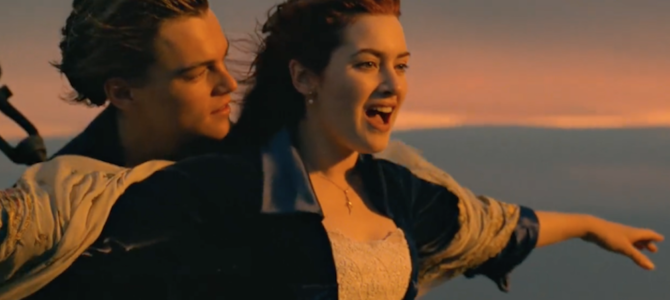
Last night marked the anniversary of the RMS Titanic’s catastrophic crash into a North Atlantic Ocean iceberg that sank the “unsinkable ship,” killing more than 1,500 people. Whether you like it or not, when most people think of this monumental disaster, they think of the Oscar-winning 1997 film, “Titanic.”
While many of the main characters in “Titanic” are fictional, the director, James Cameron, spent hundreds of millions of dollars recreating the scene to capture what made that deathly cold night in 1912 so terrifying and remarkable. It also sheds light on a stark and growing contrast between today’s standards of masculinity (or lack thereof) and those of a bygone era.
The movie’s leading lady, Rose Dewitt Bukater (Kate Winslet), is a 17-year-old first-class passenger whose wealth allows her to enjoy the most luxurious parts of the ship and socialize with the highest turn-of-the-century society. Yet Rose is unfulfilled by the trappings of wealth and prestige. In fact, when she first encounters the movie’s leading man, Jack Dawson (Leonardo DiCaprio), she is about to commit suicide by throwing herself over the edge of the ship.
Rose feels trapped and helpless as she looks to her future and an impending marriage to the insufferable and misogynistic, but very rich, Cal Hockley (Billy Zane). The marriage was arranged by Rose’s widowed mother, who has hit hard times and is struggling to maintain her lavish lifestyle.
Rose’s fiancé is controlling and abusive. Cal disapproves of Rose smoking, so he takes the cigarette from Rose and puts it out. He orders her meals without asking what she wants to eat. He even says he might start monitoring what she reads after she makes a Sigmund Freud joke. When Cal touches Rose it is always a harsh grab on the arm or wrist, never loving or tender. At the end of the film, he even violently slaps her across the face.
In many ways, Cal represents an outdated and harmful view of marriage. To Cal, the beautiful and independent-minded Rose isn’t an individual, she is a possession. It is evident that in marriage he has no intention of pursuing a partnership. He will provide, and she will obey.
Rose knows this and that is why looking back as an old woman she says: “It was the ship of dreams to everyone else. To me [the Titanic] was a slave ship, taking me back to America in chains.” Rose wants more than financial stability. She wants freedom and autonomy, even if it means taking her own life. That brings us back to Jack.
Jack is the polar opposite of Cal. He is poor and relegated to the third-class parts of the giant ship. Unlike cal, Jack loves everything about Rose, especially her spirit. Jack is also a chivalrous man who instinctively desires to protect women.
When Jack catches her trying to throw herself into the ocean, he tells her he will jump in after her if she does it. Later, when the ship is sinking, he tells her to get on a lifeboat while he stays behind. To get Rose on the boat, Jack puts on a brave face, telling her he will take another one even though he knows there is no other boat.
Cal, on the other hand, has no intention of honorably going down with the ship like the other men. He pays off a crew member to get a lifeboat seat. When that fails, he steals a crying, lost child on the Titanic and lies to a crew member, saying he is “the only one she has in the world,” so he can get a spot on a boat. Once he is rescued, he abandons the child.
Jack certainly wants to live, but he always puts Rose before himself. When the ship sinks and they are in the freezing water, he insists that Rose take the floating door that will ultimately save her life. As she lies on top of the door that will only hold one person, he holds on to the door while inside the water. The noble act famously results in Jack freezing to death. While Cal is possessive, controlling, and selfish, Jack is loving, protective, and selfless.
What would happen if the events of the Titanic unfolded today? Well, in a culture that believes gender is a construct and chivalry is paternalistic, there would be a lot more confusion about who should be saved first on the lifeboats. Gone is the age-old notion of “women and children” first. There may even be a debate about racial reparations determining the order of things.
But make no mistake, if Rose is no different than a man, there is no reason for Jack to give up the door for her. Many of today’s men, who have been taught to be selfish rather than selfless, would push Rose off the door and into the freezing Atlantic. When we stop men from being masculine or punish them for being chivalrous, women lose, and sometimes die.
Women rightly reject misogynistic and paternalistic men like Cal. However, today’s feminism does a disservice to women when it vilifies, punishes, and rejects the Jacks of the world, or labels their masculine instincts “toxic.” For it is Jack’s chivalry, his very masculine desire to protect Rose, and his willingness to sacrifice himself for her that ultimately enables Rose to fulfill her destiny.
In the beautiful final minutes of the film Titanic, we see vintage photographs of the life Rose led after she was rescued from the freezing wreckage. Through the iconic photos, we learn that Rose led an amazing, long life full of adventure, including flying airplanes, looking a lot like feminist icon Amelia Earhardt.
Authentic feminism isn’t about not needing a man. In fact, for most women, achieving their dreams and life destiny often requires the help and support of a strong man. Feminists should not mistake that for weakness, nor should they discourage good men from being chivalrous or protective of women. The world needs more, not less, Jack Dawsons.









